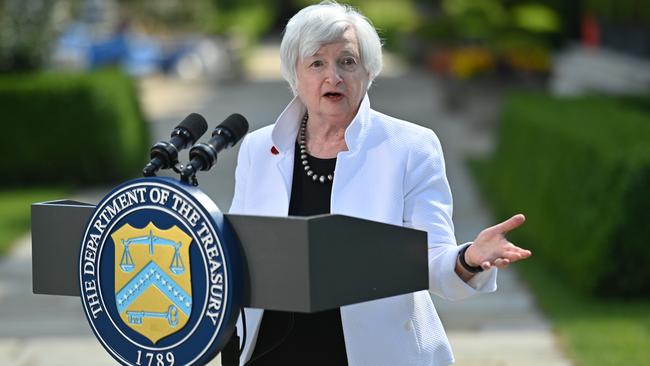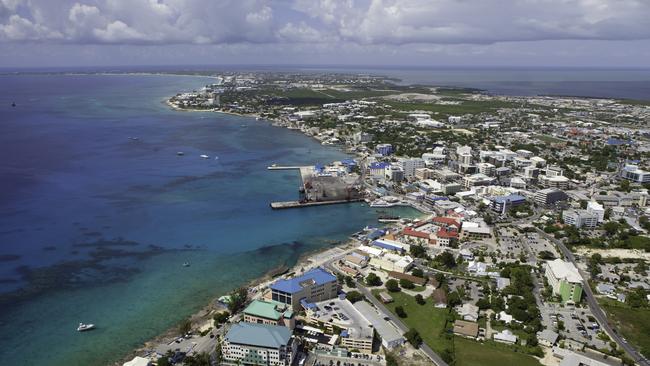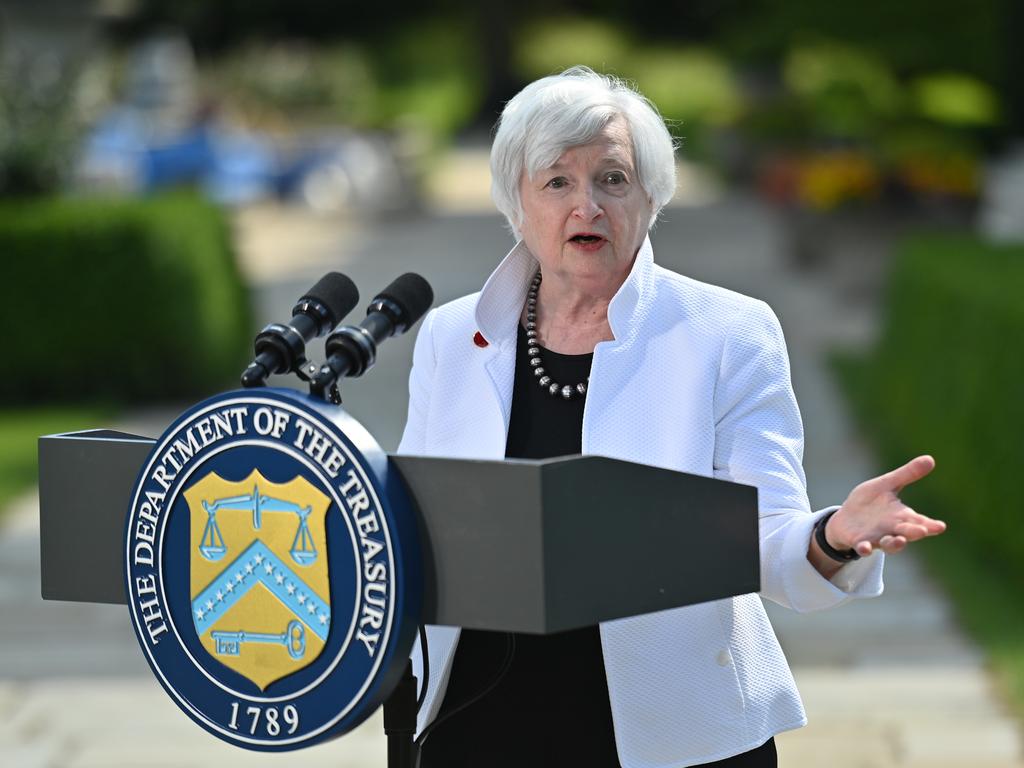Does a minimum global tax rate spell the end of the tax haven?
A lucrative business model may collapse after the G7’s finance ministers backed a minimum corporate tax rate of 15 per cent

As is often the case in multilateral matters, the US held the key. When Is Treasury Secretary Janet Yellen announced earlier this year that it was time to end the “race to the bottom” on corporate tax, her remarks supercharged sputtering talks over a global deal to overhaul how much tax multinational companies pay, and where.
Talks are focused on two main changes: reallocating taxing rights towards countries where economic activity takes place, rather than where firms choose to book profits; and setting a minimum global tax rate.
Finance ministers from the G7 group of rich countries gave the re-energised negotiating process a big fillip at their meeting over the weekend, backing a minimum rate of “at least 15 per cent” and a redistribution of taxing rights that guarantees “market” countries — ie, those where companies sell stuff — a bigger portion of taxing rights: on “at least 20 per cent of profit exceeding a 10 per cent margin for the largest and most profitable multinational enterprises”.
They also signalled a desire to defuse a transatlantic row over the taxation of (mostly American) digital giants, vowing to “provide for appropriate co-ordination” between the application of new international tax rules and the removal of punitive digital-services taxes, which European countries and others have slapped on the sales of big tech firms.
This gives the broader G20, the main forum for international tax talks, which also includes the likes of China and Russia, plenty to chew over. It is hoping to agree on terms as soon as next month, spurring the other 120 or so countries and territories involved in the talks to fall into line. Germany’s finance minister has predicted a “revolution” in global tax rules “in just a few weeks”.

All revolutions have winners and losers. In this case the clearest victors would be large economies where multinationals make lots of sales but book relatively little taxable profit, thanks to tax-planning that siphons income to low-tax jurisdictions. This mismatch has grown along with the rise of digital giants like Apple and Google, the assets of which are largely intangible.
Poor countries where global companies have factories and other operations stand to benefit, too, though not by as much as they think they should.
The most obvious losers will be the havens that, starting more than half a century ago, took increasing advantage as globalisation made capital more footloose — offering what they saw as much-needed tax competition, and what many others saw as beggar-thy-neighbour economics.
A study in 2018 concluded that around 40 per cent of multinationals’ overseas profits are artificially shifted to low-tax countries. One official closely involved in the current talks thinks the deal taking shape could “all but kill the havens”. However, havens come in various shapes and sizes, from taxless Caribbean paradises to merely tax-light hubs in Europe and Asia. Some have more to fear than others.

Paradise lost
Things look bleak for the palm-fringed, zero-tax territories, such as Bermuda, the British Virgin Islands and the Cayman Islands. Though they make nothing in corporate-tax revenue, they have, to differing degrees, come to rely on fees from subsidiaries of large companies and a cottage industry of accountants, lawyers and other corporate-service providers that sprouted up locally to serve them. Their revenue is mere crumbs compared to the taxes saved by those firms, but a lot for such small economies. Corporate and financial services accounted for over 60 per cent of the BVI’s government revenue in 2018.
The type of deal that the Biden administration is pushing (and the G7 has backed) — which would apply the global minimum rate on a country-by-country basis, rather than in aggregate — would blow up these havens’ business model. They are livid, but there is nothing they can do. A diplomat says they are in the process of being “neutralised”, and are “irrelevant” to the talks. “No one wants to hear from them.” Some at least have other revenue streams: Cayman is a big domicile for hedge funds, Bermuda for insurers.
Better-connected economies that have traditionally been friendly to corporate-tax-planners are less easy to dismiss. Several EU countries, such as Ireland and Cyprus, have lured investment with a low corporate-income-tax rate (both levy 12.5 per cent), or, as Luxembourg and the Netherlands have done, with rules that make them attractive conduits in tax structures, helping companies avoid tax in other countries.

An IMF study in 2019 found that such “phantom” investment had pushed Luxembourg’s stock of foreign-direct investment to $US4 trillion (5.1 trillion), an improbable one-tenth of the global total. Hong Kong and Singapore have also benefited as corporate-tax entrepots.
Some of the more egregious loopholes fuelling these flows have been closed in recent years, following an OECD-brokered deal in 2015. Among them is the Double Irish, which funnels profits to subsidiaries registered in Ireland but tax-domiciled in Bermuda or the Cayman Islands, and which may have saved Google alone tens of billions of dollars over a decade.
There is still plenty to lose, though. Ireland is particularly nervous, having come to rely on its 12.5 per cent rate to attract foreign investment, much of it involving real people, offices and factories. Corporate tax now accounts for a record 20 per cent of the country’s total tax take. The Irish have been lobbying America, the source of much of their investment, against a radical reallocation of taxing rights and a minimum tax above 12.5 per cent. Irish Finance Minister Paschal Donohoe has argued that smaller countries should be allowed to use tax policy to make up for the advantages of scale, location and resources that big ones enjoy.
Even a minimum rate of 12.5 per cent, or only just above it, could cost Ireland, though, when you factor in tax breaks. Many big companies using it pay an effective rate in the single digits. The country’s “patent box”, a scheme for profits from innovation, charges just 6.25 per cent. A firm paying that might quickly tire of Irish charms if faced with a six-percentage-point top-up. The government has pencilled in an annual tax-revenue loss from the putative global deal of €2bn ($3.14bn) — around 2.4 per cent of public revenue, and the equivalent on a GDP basis to America losing nearly $US140bn.
Ireland has some friends in the EU. Hungary, with a rate of 9 per cent, is a noisy champion of tax competition. Cyprus and Malta are sympathetic, too, though “happy to sit in Ireland’s shadow”, says another official. Outside the EU, Singapore and Switzerland have signalled that they consider 15 per cent too high. The Asian hub would be happier with 10 per cent.
Luxembourg and the Netherlands, however, have undergone Damascene conversions. The Grand Duchy, lambasted after a leak in 2014 exposed sweetheart tax deals with dozens of multinationals, has passed reforms that narrow tax-arbitrage opportunities and increase tax-ruling transparency. It says it could live with any deal that levels the playing field. The Dutch government, stung by public criticism of its tolerance of tax tricks, has also been trying to close loopholes.
“We won’t be the ones who obstruct the deal,” says Hans Vijlbrief, the Dutch state secretary for finance. “My goal is to not be mentioned any more in the list of tax paradises.”
That leaves Ireland and other EU malcontents in a bind. They could in theory wield vetoes, since the bloc’s tax decisions require unanimity. But that looks highly unlikely given the support for change from the union’s big members and America — not to mention the awful politics of blocking a deal seen by the public as necessary to force big business to pay its fair share.
Moreover, America and others could impose minimum taxes on their own companies even without a global deal; indeed, America already has a version for intangible income, albeit set at just 10.5 per cent. The revolution is coming, barring an unexpected breakdown in talks. And with it, a golden era for the world’s tax havens may be drawing to a close.






To join the conversation, please log in. Don't have an account? Register
Join the conversation, you are commenting as Logout